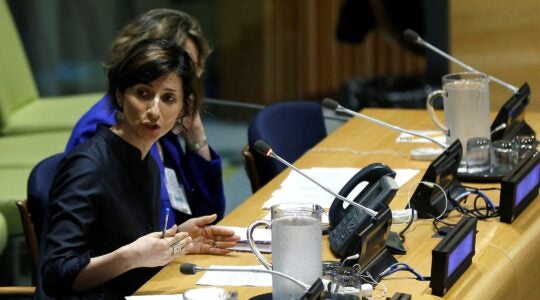WASHINGTON (JTA) — President Obama’s proposal to reduce nuclear weapons is expected to have little immediate impact on Israel’s posture because of its caveats for enemies and allies.
In the long term, however, there is some concern that a new focus on transparency ultimately could pressure Israel to make its nuclear capabilities publicly known.
For the time being, Jewish groups are hoping that the policy’s noted exception of Iran will ratchet up the pressure on the Islamic Republic to end its own opacity about its suspected nuclear weapons program.
Obama announced the planned policy shift on the eve of a new missile reduction treaty with Russia and just days before a Washington summit on nuclear security that will include Israeli leaders. The proposal would, for the first time, explicitly commit the United States to avoid using nuclear weapons against any state that abides by the nuclear non-proliferation treaty, even if such states attacked America with nonconventional arms such as biological or chemical weapons.
Pro-Israel groups were reassured by explicit and repeated assurances from the Obama administration that Iran and North Korea are exempt because of their rogue activities.
Robert Gates, the defense secretary, cast the exemption as sharpening the nuclear focus on those two states. The plan has a "very strong message for both Iran and North Korea,” he said in a news conference on Tuesday. “All options are on the table for countries in that category, along with non-state actors who might acquire nuclear weapons.”
Shoshana Bryen, the director of special projects for the Jewish Institute of National Security Affairs, said that by exempting rogue states like Iran and North Korea, the Obama administration is making it clear it will not be a pushover. "Carving out the exemption for Iran is to say, ‘We’re serious about this,’" Bryen said.
But Bryen expressed doubts about the long-term efficacy of the policy, saying that the strategy could bog down U.S. policymaking in seeking to please divergent interests. "If we tie our behavior to others who have different needs and requirements, we won’t get rid of nuclear weapons," she said.
Spokesmen for a number of pro-Israel groups would not comment, saying they were still examining the policy. One mainstream pro-Israel insider said the focus, for now, would remain on enhancing sanctions targeting Iran.
Israel’s nuclear weapons program would not be affected, because Israel is one of the few nations not to have signed on to the Nuclear Non-Proliferation Treaty. Although the Israeli government has never acknowledged that it has nuclear weapons, the government also maintains an explicit policy of never being the first to use nuclear weapons.
Avner Cohen, the author of "Israel and the Bomb" and a University of Maryland affiliate, said the plan’s emphasis on reducing ambiguity and more doctrinal explicitness eventually could pressure Israel to end its policy of opacity.
"It highlights the anachronistic nature of opacity," Cohen said. "Israel is the only nuclear weapon state that still cannot acknowledge having nuclear weapons, the very first condition of transparency."
Obama also plans to further cut the U.S. nuclear arsenal and freeze development of new nuclear weapons. The idea behind the policy, called the Nuclear Posture Review, is to take a step toward making nuclear weapons obsolete and remove the incentives for other states to pursue nuclear weapons, Obama said in an interview Monday with The New York Times.
“We are going to want to make sure that we can continue to move towards less emphasis on nuclear weapons,” Obama said, to “make sure that our conventional weapons capability is an effective deterrent in all but the most extreme circumstances.”
In an Op-Ed distributed by the White House, Vice President Joe Biden sought to allay concerns that the new policy would harm the ability of the United States to defend itself or its allies.
"Because of advances in conventional capabilities and technologies such as missile defense, we need fewer nuclear weapons to deter adversaries and protect our allies than we did even a decade ago," Biden wrote. "Under the new review, we will retain only those weapons needed for our core requirements."
JTA has documented Jewish history in real-time for over a century. Keep our journalism strong by joining us in supporting independent, award-winning reporting.





